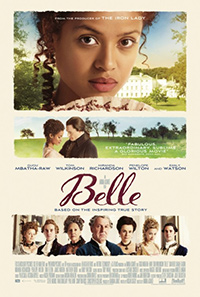But Your Picture On My Wall: Asante’s Sophomore Feature Revisits Compelling Historical Episode
 A decade after her 2004 directorial debut, A Way of Life, director Amma Asante returns with compelling follow-up, Belle, an account of Dido Elizabeth Belle, who in 1769 was an absolute rarity as a mixed race heiress more or less allowed to mingle with the rigid aristocracy. A captivating chronicle related to us with fascinating and melodramatic aplomb, you’ll most likely want to research the eponymous woman at the center of Asante’s tale and be disappointed that there’s actually very little known about her. We can assume that many liberties were taken in the rendering of Asante’s film, though despite some heavy handed clichés here and there, screenwriter Misan Sagay, who previously adapted Zora Neale Thurston’s Their Eyes Were Watching God, writes a superbly plum role inhabited gloriously by Gugu Mbatha-Raw. You may be disappointed in your wish to look further into the life of Belle beyond the film, but you’re not likely to forget the captivating Mbatha-Raw, who, in all fairness, should receive due recognition for her work here in this tale that plays something like the Jane Austen version of 12 Years a Slave.
A decade after her 2004 directorial debut, A Way of Life, director Amma Asante returns with compelling follow-up, Belle, an account of Dido Elizabeth Belle, who in 1769 was an absolute rarity as a mixed race heiress more or less allowed to mingle with the rigid aristocracy. A captivating chronicle related to us with fascinating and melodramatic aplomb, you’ll most likely want to research the eponymous woman at the center of Asante’s tale and be disappointed that there’s actually very little known about her. We can assume that many liberties were taken in the rendering of Asante’s film, though despite some heavy handed clichés here and there, screenwriter Misan Sagay, who previously adapted Zora Neale Thurston’s Their Eyes Were Watching God, writes a superbly plum role inhabited gloriously by Gugu Mbatha-Raw. You may be disappointed in your wish to look further into the life of Belle beyond the film, but you’re not likely to forget the captivating Mbatha-Raw, who, in all fairness, should receive due recognition for her work here in this tale that plays something like the Jane Austen version of 12 Years a Slave.
It’s 1769 and Dido Elizabeth Belle happens to be the illegitimate and mixed race heir of a Royal Navy Admiral (Matthew Goode) who saves her from the slums and insists she be raised by her aristocratic Great Uncle Lord Mansfield (Tom Wilkinson) and his wife (Emily Watson) while he’s away at sea. At first reluctant, the Lord and Lady agree to raise her, supposing she will be an excellent companion for her half-cousin, Elizabeth. Fast forward to their young adulthood, Dido (Mbatha-Raw) and Elizabeth (Sarah Gadon), are now inseparable. Dido’s father dies at sea, leaving her the sole heiress to his sizeable fortune, which means she can avoid the dastardly courtship game that Elizabeth, who has no dowry, must suffer through. As this drama rears tension, Dido begins to have feelings for a passionate young man, John Davinier (Sam Reid), who enters her father’s tutelage to study law. He’s the son of a vicar, so options are limited for him, and his only possible ascension in the judiciary system would be from the backing of a powerful man like Lord Mansfield, one of the most (politically) powerful men in all of England. Except, the idealistic Davinier is at odds with how Mansfield is handling a current hot topic case known as the Zong massacre, a 1781 incident that saw 142 disease ridden slaves chained together and dumped into the sea as they were worth more as dead cargo from the insurers than live property. As the isolated Dido begins to learn of her uncle’s potential influence in the case, she also begins to discover her voice.
Asante and screenwriter Sagay essentially play everything safely, seeming to calibrate the tone and drama without pushing the envelope. Not to say the issue of slavery is skirted around, it’s just discussed as tastefully as perhaps could be warranted, which helps make it seem (and appeal to) Jane Austen acolytes, topped with a denouement that feels rather similar to the courtroom scenes of To Kill a Mockingbird.
Flourishes like speeding through a decade as the girls twirl raucously in the yard and morph into their elder counterparts seems clunky, as do several impassioned speeches Sam Reid has to give that are finely written monologues yet hopelessly gauged for the romantic swoon. A strong supporting cast is uniformly engaging, the ever dependable Wilkinson and Watkins strike fine poses, as does the always watchable Miranda Richardson, here a racist, status-hungry shrew. Sarah Gadon, often underwhelming, gets some screen time of interest as the sister-cousin aggressively positioned for the Austen cliché ironically hampered by her cousin’s trump card – money.
But at the end of the day, the film’s most fascinating asset is the alluring Mbatha-Raw who gives a grand lead performance as the strong willed Dido Belle. Whatever liberties may or may not have been taken, it’s a resonant spectacle. There’s nothing more liberating than being alleviated from living by the rigidity of the majority due their rejection of your existence—especially when you can afford not having to play by their rules.


